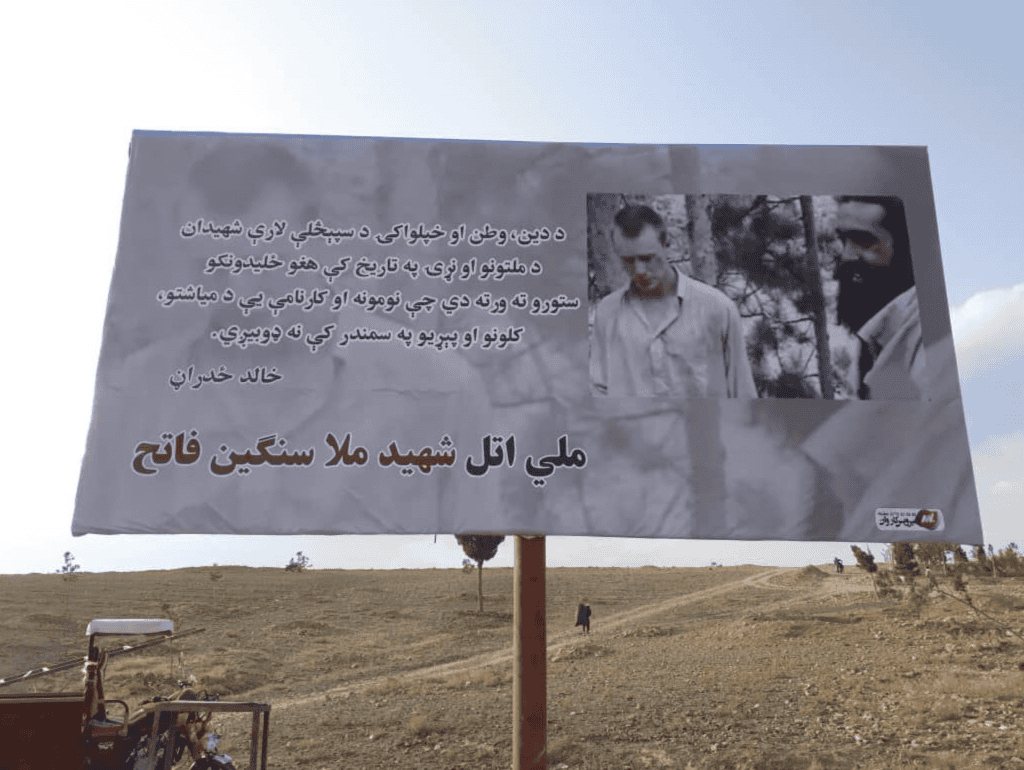
The Taliban feted one of its famed commanders, Mullah Sangeen Zadran, on a new billboard that also showed Bowe Bergdahl, an American soldier who was held hostage by Sangeen and the Taliban for nearly five years. Sangeen, who was killed in a drone strike in 2013, admitted the ties between the Taliban and Al Qaeda were unbreakable.
The billboard of Sangeen and Bergdahl was raised in Khost province, a stronghold of the Haqqani Network, a powerful Taliban subgroup. Sirajuddin Haqqani, one of the Taliban’s two deputy emirs, is the group’s interim Minister of Interior, arguably one of the most influential postings as he controls the group’s internal security forces. Several other Haqqani leaders hold high-profile posts in the new Taliban government.
Sangeen served as the Taliban’s military commander and then shadow governor of Paktika province in eastern Afghanistan, as well as a senior aid to Sirajuddin before he was killed in a U.S. drone strike in the Ghulam Khan area of Pakistan’s Taliban-controlled tribal agency of North Waziristan on Sept. 5, 2013.
Four years before his death, Sangeen openly admitted that the bond between the “brothers” of Al Qaeda and the Taliban were unbreakable. In an interview released in Sept. 2009 by As Sahab, Al Qaeda’s official media outlet, Sangeen said: “We do not see any difference between Taliban and Al Qaeda,” and the two groups “are all one and are united by Islam.” Sangeen also noted that Osama bin Laden “has pledged allegiance” to Taliban emir Mullah Muhammad Omar “and has reassured his leadership again and again.” The full quote is reproduced below.
As-Sahab: How is your relation with your brothers in Al-Qaeda and what is the level of cooperation between you?
Mawlawi Sangeen: All praise is for Allah, Al-Qaeda and Taliban all are Muslims and we are united by the brotherhood of Islam. We do not see any difference between Taliban and Al- Qaeda, for we all belong to the religion of Islam. Sheikh Usama has pledged allegiance to Amir Al-Mumineen (Mulla Muhammad Umar) and has reassured his leadership again and again. There is no difference between us, for we are united by Islam and the Sharia governs us. Just as the infidels are one people, so are the Muslims, and they will never succeed in disuniting the Mujahideen, saying that there is Al- Qaeda and Taliban, and that Al-Qaeda are terrorists and extremists. They use many such words, but by the Grace of Allah, it will not affect our brotherly relationship. Now they are also trying to disunite the Taliban, saying that there are two wings, one extremist and another moderate. However, the truth is that we are all one and are united by Islam.
Mullah Sangeen Zadran, in an interview with As Sahab, Al Qaeda’s official media outlet.
Two years before Sangeen was killed, the U.S. State Department added him to the list of Specially Designated Global Terrorists for supporting Al Qaeda. According to State, Sangeen helped “lead fighters in attacks across Southeastern Afghanistan, and is believed to have planned and coordinated the movement of hundreds of foreign fighters into Afghanistan.” At the time, FDD’s Long War Journal asked State if the term “foreign fighters” mentioned in the designation included members of Al Qaeda, and the response was “Yes. Absolutely.”
The year before he was killed, Sangeen released two videos that encouraged foreign fighters, including Turks and Kurds, to wage jihad in Afghanistan. In the second video, Sangeen promoted clips that showed fighting in Afghanistan, Algeria, Chechnya, Iraq and Somalia, and suggested that the jihad spread to the countries of China, Nigeria, Pakistan, the Philippines and Yemen.
Sangeen’s support for Al Qaeda was on display at the moment of his death. Also killed alongside Sangeen on Sept. 5, 2013 was an Al Qaeda explosives expert from Egypt who was known as Zubir al Muzi. At the time of the strike, U.S. intelligence officials told FDD’s Long War Journal that Muzi was also a mid-level commander in al Qaeda’s Lashkar al Zil, or Shadow Army, the paramilitary force that fields small conventional units in both Afghanistan and Pakistan, and embeds military trainers within Taliban units. Before he was killed, Sangeeen was considered to be one of the most dangerous operational commanders in eastern Afghanistan, and had organized multiple assaults on U.S. and Afghan combat outposts in the region.
State’s designation of Sangeen also noted he was “believed to have orchestrated the kidnappings of Afghans and foreign nationals in the border region between Afghanistan and Pakistan.” His most high-profile kidnapping was of Bergdahl, the American soldier who left his unit in Paktika province and was subsequently captured by the Taliban.
Bergdahl was held for nearly five years before being exchanged for the top five Taliban commanders being held at Guantanamo Bay. Sangeen was holding Bergdahl in his custody up until the moment he was killed. Four of the five Taliban leaders who were exchanged for Bergdahl have been given ministerial posts in the Taliban’s new cabinet. The fifth was Mohammad Nabi Omari, a Haqqani Network leader who has been named the Taliban’s governor of Khost province, where the billboard celebrating Sangeen’s service to the Taliban stands.







